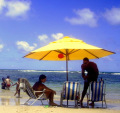Step 8: Preparation & Packing
 Monday, February 1, 2010 at 05:43PM
Monday, February 1, 2010 at 05:43PM In preparation it is a good idea to make a list of things you “must take” with you, and those you “may take” with you. But, first a few basic packing tips:
- Have you checked your luggage allowances? Do not pack more than you can carry unless you are prepared for the surcharges
- Label you bags, inside and out, with your name, destination address, home address, email address and phone numbers.
- Ensure all tags from previous travels are removed from your checked in baggage
- Do not take sharp objects in your hand luggage, they may get confiscated.
- Do not pack valuables in your checked in baggage
Must Take:
Clothing - Enough appropriate clothing (unless you plan to do some clothes shopping whilst on holiday).
Luggage - Have you got the bags and cases you need for the trip?
Medication - A large enough supply of any prescribed medication you may need to take. It is also a good idea to print out details of any medical conditions and medications you are taking, to carry them with you in case of an accident or emergency.
Money - Some cash in each currency you may need, plus credit cards and / or a Pre-Pay Currency Card. The most widely accepted cards are VISA or MASTERCARD, but not all shops and restaurants take them, or may only accept one or the other. Other cards have much more limited acceptance.
If you do plan to use your credit cards, have you advised your card issuer that you plan to use them abroad? Some cards are automatically blocked if used abroad, unless you have informed the card issuer. This is a common security measure designed to protect you from fraud.
Traveler´s Cheques are hard to cash, and you are likely to incur charges and / or get a poor exchange rate. A better alternative are Pre-Pay Currency Cards designed for the traveler. Although quite a new concept they offer such benefits that they are quickly gaining in popularity.
Documents:
- Tickets
- Country entry visa (if required)
- Reservations and itinerary details. Two copies to be kept in seperate bags in case one gets lost. Posting the information to the internet in a way you can read it from any internet connection during your travels would also be wise.
- Insurance Policy Documents
- International Driving License (if required)
- List of useful telephone numbers & contact details
- Credit card company numbers to report lost or stolen cards
Adaptors - For electricity supply, a universal adaptor is highly recommended.
May Take
- Footwear for different activities and weather
- A hat
- Sun-block
- Sunglasses
- Phone, iPod, laptop, chargers, batteries, memory cards
- Guide books, maps, other info
- Phrase book
- Earplugs
- Books to read
- A small torch
- Insect repellant
- Medication: diarrhea pills, headache tablets etc, just in case
- Pens and a small notebook
Before You Leave
There are a few things you should consider doing before you leave, to avoid problems at home whilst you are away, and in case you have problems abroad. A little extra planning may give you peace of mind:
- Leave a list of your itinerary, and contact details whilst abroad, with family and friends
- Ask family or friends to check your home occasionally whilst you are away
- Switch of gas, electricity and water supplies to avoid the risk of fires or flooding, especially if you are away for a long time
- Make sure any build-up of postal deliveries is out of sight, so you don´t invite break-in´s
- Make sure you have informed credit card issuers you are travelling
- Check your phone will work abroad if you are taking it with you. You may need to call your service provider to confirm this.
Continue to Step 9












